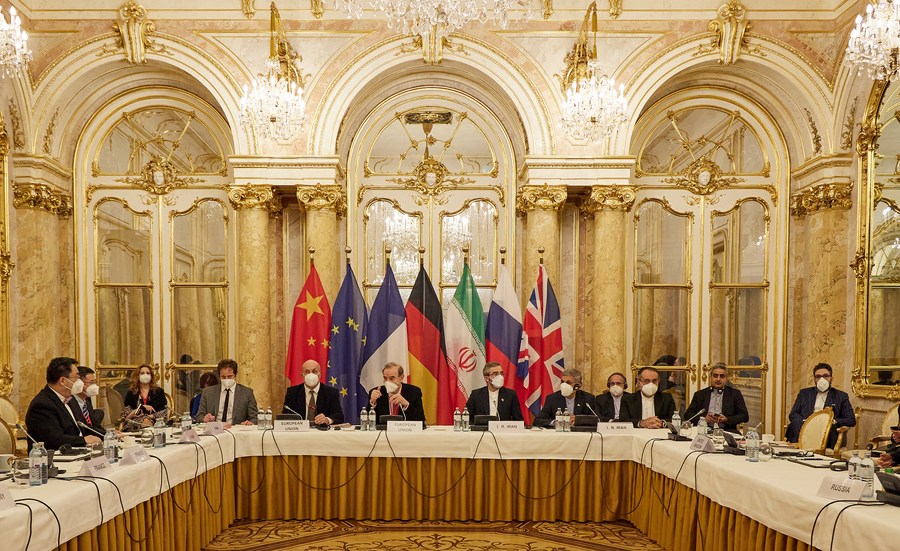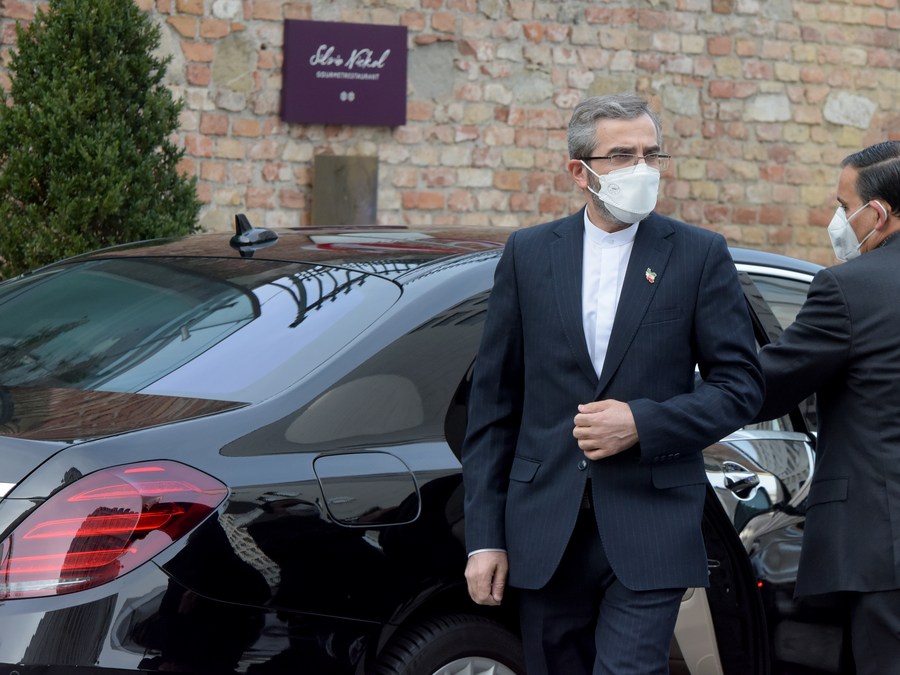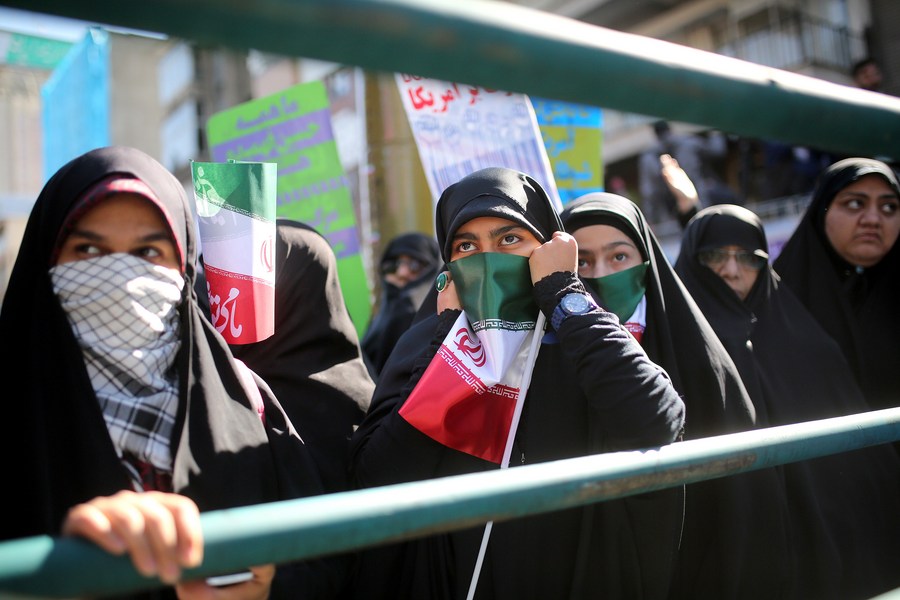Will Iran, U.S. reach consensus to salvage Iranian nuke deal as Vienna talks enter final stage?

Photo taken on Dec. 9, 2021 shows a meeting of the Joint Comprehensive Plan of Action (JCPOA) Joint Commission in Vienna, Austria. (EU Delegation in Vienna/Handout via Xinhua)
"This (Vienna nuke) session is the critical one," a senior U.S. government official says. "We are genuinely in the very final stretch."
TEHRAN, Feb. 10 (Xinhua) -- Negotiations on reviving the 2015 Iranian nuclear pact resumed on Tuesday in Vienna after a 10-day break, as both Iran and the United States have recently hinted at a possible deal in the Austrian capital.
Judging by the comments of different parties, the Iranian nuclear negotiations seem to have entered the final stage despite remaining differences, pending political decisions from capitals on a potential agreement, analysts said.
"FINAL STRETCH"
The administration of U.S. President Joe Biden believes it has until the end of February to resuscitate the 2015 nuclear pact, formally known as the Joint Comprehensive Plan of Action (JCPOA) which the United States discarded four years ago under its former President Donald Trump, otherwise Washington will have to "change tack and launch aggressive efforts" to prevent Tehran from obtaining a nuclear weapon, CNN reported on Wednesday, citing three U.S. government officials.
"This session is the critical one," a senior government official was quoted as saying. "We are genuinely in the very final stretch."
In his phone conversation with top Russian diplomat Sergey Lavrov on Tuesday, Iranian Foreign Minister Hossein Amir Abdollahian stressed Iran's resolution to "seek a good agreement within the framework of its interests and rights," expressing his country's readiness to reach such an agreement as soon as possible.
Given the "undesirable trends undermining the JCPOA, there is a need to swiftly conclude these negotiations," Enrique Mora, the European Union's coordinator in the negotiations, tweeted on Monday.
"We need spirit of compromise to take us back to full implementation," Mora said.
Liu Lanyu, an Iran expert at the Institute for International and Area Studies of China's Tsinghua University, told Xinhua that the negotiations are approaching a "balanced point," at which it is hard for the United States and Iran to persuade each other to further make major concessions and the room for bargaining is limited.

Iran's chief nuclear negotiator Ali Bagheri Kani arrives at the venue of the new round of Iranian nuclear deal talks in Vienna, Austria, Nov. 29, 2021. (Xinhua/Guo Chen)
POSITIVE DEVELOPMENTS
The United States announced last week its intention to waive sanctions on Iran's civilian nuclear program, which allows international nuclear cooperation projects with the country.
The sanctions waiver "is designed to facilitate discussions that would help to close a deal on a mutual return to full implementation of the JCPOA and lay the groundwork for Iran's return to the performance of its JCPOA commitments," the U.S. State Department said in its report to Congress.
In response, Iran said the U.S. move to restore sanctions waivers was "good but not enough," calling for "realism and tangible and real actions by the West," as said by Amir Abdollahian.
"Real, effective and verifiable economic benefit for Iran is a necessary condition for the formation of an agreement" in the ongoing Vienna talks, Secretary of Iran's Supreme National Security Council Ali Shamkhani tweeted recently, noting "a show of lifting sanctions is not considered constructive."
The Republic of Korea confirmed last month that with the U.S. approval, it has paid Iran's delayed membership dues, amounting to 18 million U.S. dollars, to the United Nations from the Iranian funds which have been frozen in the country because of the U.S. sanctions.
These moves can be interpreted as efforts by the United States and Iran to build confidence and show sincerity with concrete actions, Liu said, adding practical measures have been taken to push the negotiations in a sound direction.
The overall prospect of the Vienna talks is "optimistic," as both Iran and the United States have shown a positive attitude toward the negotiations, said Fan Hongda, a professor at the Middle East Studies Institute of Shanghai International Studies University in China.

Iranian students take part in a rally marking the 37th anniversary of taking over the U.S. embassy by a group of Iranian students in Tehran, capital of Iran, on Nov. 3, 2016. (Xinhua File photo)
POLITICAL DECISIONS
The negotiations had "reached a point where political leaders needed to decide whether they would agree to key elements of an accord that would essentially return" to the JCPOA, a senior U.S. State Department official was recently quoted by The New York Times as saying.
A source close to the team of Iranian negotiators in Vienna told Iran's Tasnim News Agency on Monday that unlike Washington, Tehran has made its political decision.
"The main obstacle is the lack of a political decision by the United States," the source said on condition of anonymity.
In a letter to Biden on Monday, a group of 33 Republican senators said any deal with Iran on restoring the JCPOA requires Senate approval, warning the U.S. president that they will do everything in their power to block a possible deal if he moves forward without them.
"Voices from the U.S. show that there is no coherence in the country to make political decisions in the direction of advancement in the Vienna talks," Shamkhani wrote in a tweet on Wednesday.
Still, Tehran-based foreign policy analyst Diako Hosseini told Al Jazeera that "chances of the talks being successful are more than their failure, unless the sides overstep in their final efforts to gain more concessions."
"Under current circumstances, returning to the deal and keeping the window of diplomacy open is the best realistic option," he said.
Photos
Related Stories
- U.S. "genocide" allegation is lie of century: spokesperson
- Coronavirus claims over 80,000 lives in 2nd largest U.S. state Texas
- U.S. school shootings "tsunami" in 2021-2022 school year: report
- China's top legislature slams U.S. bill with negative China content
- 28 pct Americans believe U.S. would "never" contain COVID-19 pandemic: Washington Post
Copyright © 2022 People's Daily Online. All Rights Reserved.










